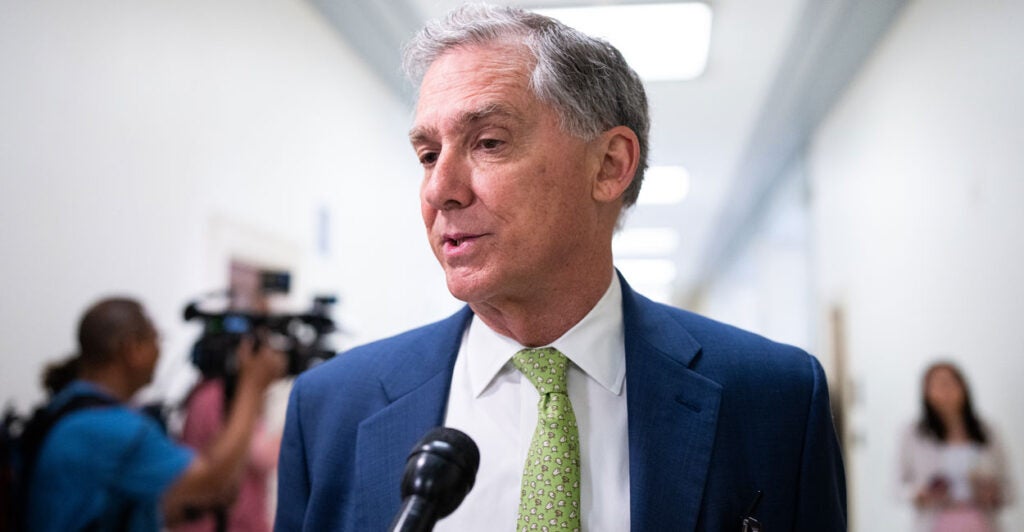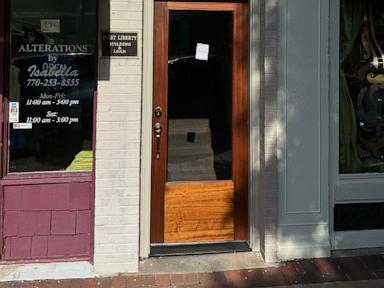After slowing down the Republican leadership’s attempt to advance a bundle of cryptocurrency market reform bills, the conservative House Freedom Caucus and its allies appear to have secured a promise to prohibit the Federal Reserve from issuing a digital U.S. dollar.
Caucus members contend that’s a victory for Americans’ freedoms.
The deal allowed for House Republicans to advance three important pieces of cryptocurrency legislation and stick to a sufficient timeline for passing a rescissions bill defunding public broadcasting and foreign aid facing a Friday deadline.
“This is a significant win for the American people as a government-controlled digital currency poses a direct threat to financial privacy and economic freedom,” House Freedom Caucus Chairman Rep. Andy Harris, R-Md., wrote on the social media platform X on Wednesday night after securing an agreement with House leadership to put anti-central bank digital currency provisions in the annual defense authorization bill.
“By securing these protections, we will be taking a critical step to stop government overreach and to preserve individual liberty,” he added.
But the agreement came only after a multiday slog of negotiations on Capitol Hill.
On Tuesday, House GOP leadership brought a rule to the House floor to advance three cryptocurrency bills: the GENIUS, CLARITY, and Anti-CBDC Surveillance Acts. The rule ultimately failed.
The GENIUS and CLARITY acts resolve questions about the regulatory framework surrounding cryptocurrency, which has long been messy and decentralized, with a number of regulators navigating vague boundaries.
But Freedom Caucus members and their allies expressed concerns that Congress might pass these first two acts, but neglect to advance safeguards against central bank digital currency.
Rep. Chip Roy, R-Texas, explained Wednesday that he and his conservative cohort view a government digital currency as a threat to liberty and privacy.
“We believe a line in the sand is that we’ve got to have an emphatic statement from the government of the United States that the government is not going to be tracking your money to prevent you from being able to buy guns … to buy gasoline, if they want to go to all [electric vehicles],” he said.
“To prevent you from being able to live your life freely and be able to monitor your transactions like the Chinese Communist Party. We don’t do that here. This is a country that’s supposed to embrace freedom,” Roy said.
The vote on the rule to advance the three crypto bills failed 196-223 on Tuesday when 13 Republicans joined Democrats in opposition, demanding that leadership embed anti-CBDC provisions into one of the other pieces of cryptocurrency legislation.
President Donald Trump met with the GOP holdouts at the White House on Tuesday night and shortly afterward announced he had come to a deal with the members, who “all agreed to vote tomorrow morning in favor of the rule.”
The next day, Harris said, they had found a deal with the White House to insert anti-CBDC provisions into the CLARITY Act.
“Under this agreement, the Rules Committee will reconvene later [Wednesday] to add clear, strong anti–central bank digital currency (CBDC) provisions to the CLARITY legislation,” he wrote.
But the agreement ran into some headwinds quickly when the House Rules Committee canceled its planned 4 p.m. meeting.
“There was some sort of an agreement that doesn’t appear to exist anymore, and that’s all I got to say,” said Roy.
Punchbowl News reported that much of this gridlock was due to worries from chairmen Rep. French Hill, R-Ark., of the Financial Services Committee and Rep. Glenn Thompson, R-Pa., of the Agriculture Committee, since adding anti-CBDC provisions might make passing the CLARITY Act more difficult.
“I think those discussions actually continue,” Hill said Wednesday of Trump’s negotiations with holdouts.
 Rep. French Hill, R-Ark. (Bill Clark/CQ-Roll Call via Getty Images)
Rep. French Hill, R-Ark. (Bill Clark/CQ-Roll Call via Getty Images)The Wednesday vote ended up being the longest recorded vote in the history of the House of Representatives, breaking a record that was set earlier this month when leadership advanced the budget reconciliation measure known as the “Big, Beautiful Bill.”
The gridlock was ultimately resolved late in the night when leadership came up with a final compromise—inserting anti-CBDC provisions into the annual National Defense Authorization Act.
This compromise yielded the votes to advance the three cryptocurrency bills. The rule passed 217-212 after being held open for more than nine hours.
“House Freedom Caucus Members reached an agreement tonight to advance the president’s cryptocurrency agenda and, as part of this agreement, the National Defense Authorization Act (NDAA) will include strong anti–Central Bank Digital Currency (CBDC) protections in this must-pass legislation,” Harris wrote Wednesday night.
He added, “This is exactly why the House Freedom Caucus fights—‘Freedom‘ is our middle name—and we will continue to fight to protect the rights of Americans every day.”
House Majority Whip Tom Emmer, R-Minn., who created the anti-CBDC bill, also applauded integrating the CBDC legislation into the defense authorization bill.
“Even Republicans years ago were saying ‘Oh, we’re falling behind the Chinese; they have the digital yuan.’ You know what they use that for? That is a surveillance tool,” he said Thursday. “That is completely against any American value that we know of, and we’ve got to prevent our central government from ever creating this surveillance tool here in the United States of America.”
Rep. Tim Burchett, R-Tenn., who was a holdout throughout the process, spoke proudly of the deal.
“We did what we set out to do. We went a little slower, and guess what—we got there a little faster,” he said shortly after the vote. “Big Brother loses once again.”
Now, it will be up to Speaker of the House Mike Johnson, R-La., to hold the Senate’s feet to the fire to keep the anti-CBDC provisions in the NDAA.
The GENIUS Act ultimately passed on a 308-122 vote Thursday. The CLARITY Act also passed, 294-134. The Anti-CBDC Surveillance Act passed by a much narrower 219-210 margin. GENIUS will now go to the president’s desk for final signature.
The post Freedom Caucus Prevails on Measure to Block Central Bank Digital Currency appeared first on The Daily Signal.
.png)














 English (US)
English (US)